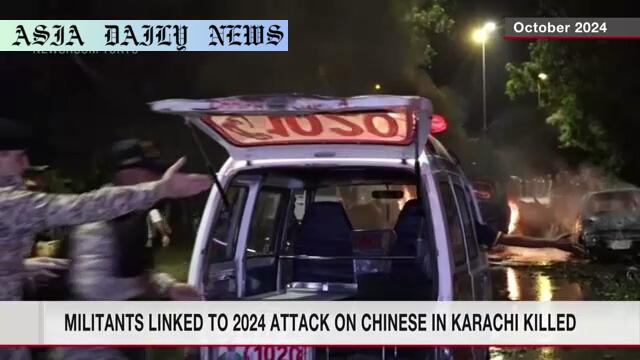Militants linked to violence in Karachi targeting Chinese nationals killed in security raid, highlighting growing regional tensions.
- Pakistani security forces killed three militants in Karachi during a raid.
- The militants were affiliated with the Tehrik-e-Taliban Pakistan (TTP).
- Attacks on Chinese nationals in Pakistan have been increasing, linked to projects under Beijing’s Belt and Road initiative.

Militant Operations in Karachi
Pakistani security forces successfully conducted a critical raid late Sunday night in Karachi, eliminating three militants tied to an attack against Chinese nationals in November 2024. Officials confirmed these militants were deeply entrenched within the framework of the Tehrik-e-Taliban Pakistan (TTP), a notorious organization aligned with recent violent episodes across the region.
The assault that brought these militants under scrutiny occurred when a Pakistani guard at a textile factory fired shots, wounding two Chinese workers. This incident further highlighted underlying tensions surrounding China’s expanding footprint in the region, particularly in connection to its Belt and Road initiative. Pakistan’s law enforcement agencies acted decisively on intelligence reports to neutralize this threat, ensuring regional safety and security.
Rising Threats Against Chinese Nationals in Pakistan
China’s extensive involvement in Pakistan through its multi-billion-dollar infrastructure projects, particularly in resource-rich yet conflict-torn provinces like Balochistan, has faced growing backlash from insurgent factions. Militant organizations accuse Beijing of exploiting local resources, creating friction between the population and foreign investments.
The October attack near Karachi’s international airport, which claimed the lives of two Chinese nationals, painted an alarming picture of the security risks Chinese professionals face while working in Pakistan. This, coupled with repeated threats from groups like the TTP, highlights the need for a robust counterterrorism strategy to protect foreign workers and investments.
Counterterrorism Efforts and Regional Stability
Pakistan, facing both economic challenges and rising internal unrest, finds itself under pressure to combat insurgent violence. The raid in Karachi signifies the country’s commitment to safeguarding its international partnerships. Strategic operations targeting militant hideouts continue to be pivotal in restoring a sense of stability to the region.
However, addressing the root causes behind such tensions, including grievances over resource allocation and perceived exploitation, remains critical. The Chinese government, alongside Pakistani authorities, must ensure community-inclusive projects to foster local goodwill and reduce animosity towards foreign investments. Progress on these fronts ensures that economic growth and development initiatives proceed without impediment.
The Broader Implications
The elimination of these militants extends beyond addressing immediate security threats. It sends a clear message to insurgent groups like the TTP that acts of violence against foreign nationals or economic projects will not be tolerated. This decisive action is likely to influence Pakistan’s international reputation amidst efforts aimed at attracting more foreign investment.
While challenges persist, including tackling extremist ideologies and ensuring minority rights, strategic cooperation between nations such as China and Pakistan promises to pave the way for greater economic and social stability in the region. Enhancing transparency and accountability in the implementation of initiatives like the Belt and Road project could be key to addressing underlying conflicts effectively.



Commentary
The Urgent Need for Security in Development Zones
The recent raid in Karachi underscores the delicate balance Pakistan must maintain between development and security. While the elimination of the militants tied to attacks against Chinese nationals demonstrates effective counterterrorism efforts, it also sheds light on the broader challenges facing the region. Security forces deserve commendation for acting swiftly, but this incident highlights an ongoing, larger problem that requires nuanced, long-term solutions.
Implications for Chinese-Pakistani Relations
China’s Belt and Road initiative has emerged as a cornerstone of development in Pakistan. However, repeated attacks on its citizens risk straining relations between the two nations. While the Pakistani government must address security concerns, it is equally vital to foster more inclusive developmental policies. By engaging local communities and addressing their grievances, Pakistan and China can ensure a more stable and beneficial environment for collaborations.
A Path Towards Regional Peace
Moving beyond immediate security issues, it is essential to consider the underlying reasons for unrest in regions like Karachi and Balochistan. Economic inequality, lack of inclusivity, and grievances over resource distribution have fueled insurgencies. Addressing these through transparent policies and community-driven outreach programs could significantly reduce tensions and pave the way for lasting peace in Pakistan.